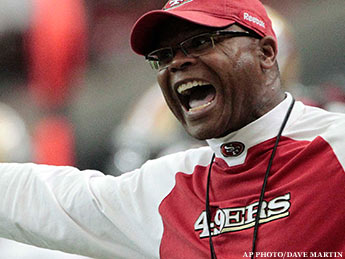
It was among the final scenes from Tyrone Willingham’s last year at Notre Dame. It was a game against Pittsburgh and he was yelling and screaming, stalking the sideline as if his whole world were about to collapse.
I said to myself, “That’s not him.”
I suspected that Willingham had been told not to appear so calm in the heat of battle. And I suppose he acquiesced because his job was on the line. But it mattered not how many hoops he jumped through. He still got fired.
I think about that each time I hear the names Jim Caldwell or Tony Dungy. See, there’s this peculiar refrain in sports -- unoriginal and uttered more as a reflex than a fully formed thought. And it’s casually tossed about -- by observers, fans, media types -- whenever someone is deemed too "cool" for situations that are decidedly hot.
“He needs to show more emotion.”
Anger seems to be the prescribed recommendation for every decision-maker these days. From the Oval Office to the sideline, the masses demand histrionics. But what role does anger play for an athlete? For a coach? Will it make you better? Will it make your players try harder? Will it convince the casual fan that you care as much as he does?
Willingham once said something that’s pertinent to anyone who has ever played the game: “Players don’t need you to scream at them,” he said. “They need a plan.”
Screaming is not a plan. Irrational behavior is not passion. And rage won’t save the day. I know that a coach could yell at me and I could get all fired up, but no amount of enthusiasm would do much good if we were playing a defense designed to take away the out route and the guy I was covering was running a post.
I’m not saying there isn’t a place for emotion. There’s certainly a practical use for anger. Former NFL linebacker Bryan Cox used to prepare for a game by convincing himself that his opponents were trying to break into his house and rape his wife and harm his children. Sufficiently lathered, Cox ran onto the field and neatly applied his theory. Reporters gathered round him, rapt on his fury. And for good reason; it was great stuff.
But some years later, when Cox trained his sights on less imaginary topics, like the dearth of black football coaches and general managers, I don’t think that anger was met with the same level of giggly awe. Controlled rage is symmetrical with a violent game, but the ex-jock who rants excessively is easily dismissed as a loon.
That brings us to Mike Singletary.
Singletary is not known for being docile. Singletary is a man who by all appearances fits the bill of what the rank and file desire in leadership. He’s excitable and engaged, and in the most critical circumstances, you wouldn’t be surprised to see him actually breathe fire. The man who starred in the '80s reprisal of the Monsters of the Midway is the exemplar of passionate expression. Our most lasting image of him as a player is his eyes: Impossibly wide and fixed on his prey, as if on contact his eyeballs might come spilling over his facemask.
Singletary brought that fervor to the sideline. But alas, once you become a coach you have to put away player-like things. In his three years as head coach of the 49ers, he’s stirred more nostalgia than winning seasons. He intimidated the press and berated his charges until he was rudely dumped in December.
But it was in Week 5 when the damage was done. That’s when we saw Singletary shouting at his quarterback, Alex Smith. I suppose it was Singletary’s way of getting a particular response from Smith. Problem was, the former first overall pick has seen, and heard, just about everything. What Smith hasn’t seen, or heard, is a consistent plan of attack from anyone who controls the franchise.
In the weeks since that game, all the talk has been about Singletary’s approach. Even John Madden chimed in, saying that “isn’t what coaching was about.” Madden was concerned that Singletary’s display would serve as unconditional approval for all such antics. Madden lamented the state of football all the way down to the pee-wee level, where screaming has long been the norm for a certain stripe of whistle-toting cretin who is long on theatrics but short on fundamentals.
There is a time for shouting. And that time is indeed on Sunday afternoon. But when the ball is placed on the tee, all that hullabaloo may endear you to fans, but I guarantee it won’t make plays. You see, most games are won on Wednesday morning, when the game plan is implemented. That’s when strategies are explained and philosophies are taught. I know it’s not sexy and it won’t get highlights. But weekly repetition and a penchant for showing up -- regardless of audience or circumstance -- is passion. It’s the kind of passion that wins games and saves careers.
Even if it’s not that loud.
-- Alan Grant played cornerback for the Colts, 49ers, Bengals and Redskins. He is the author of
"Return to Glory: Inside Tyrone Willingham's Amazing First Season at Notre Dame."

